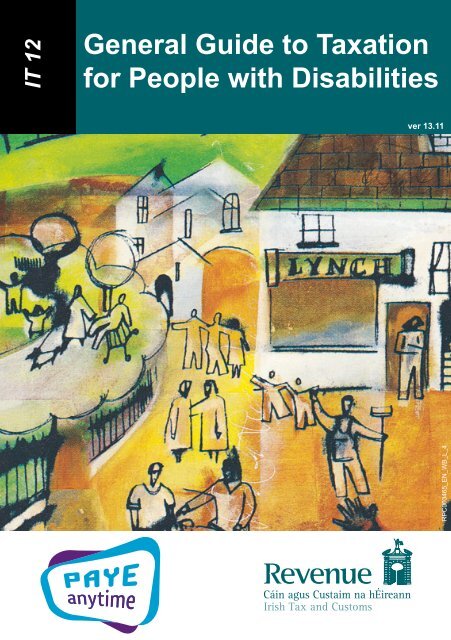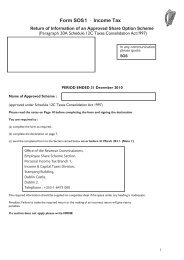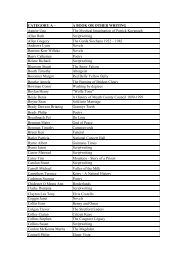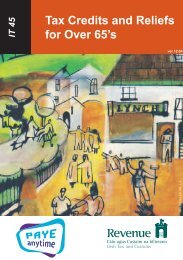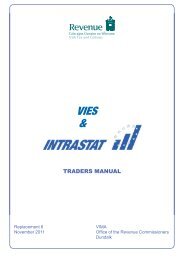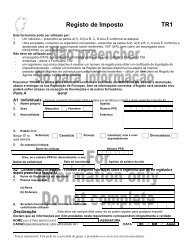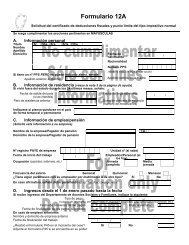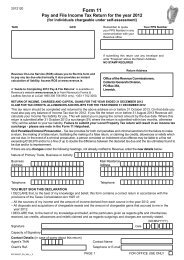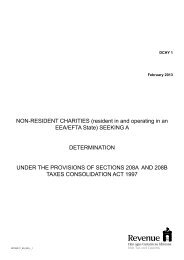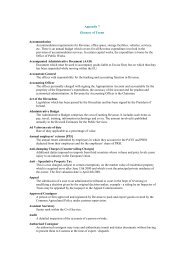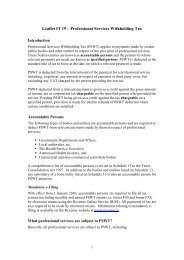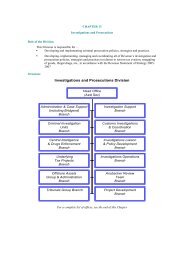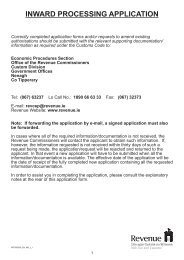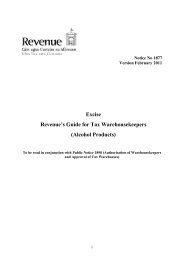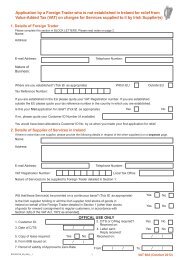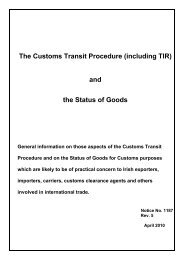IT12 - Revenue Commissioners
IT12 - Revenue Commissioners
IT12 - Revenue Commissioners
You also want an ePaper? Increase the reach of your titles
YUMPU automatically turns print PDFs into web optimized ePapers that Google loves.
IT 12<br />
General Guide to Taxation<br />
for People with Disabilities<br />
ver 13.11<br />
RPC003465_EN_WB_L_4
Introduction<br />
This is a guide to the tax credits, reliefs and exemptions that may<br />
be claimed by an individual with disabilities of a permanent nature.<br />
In general, individuals with disabilities are liable to pay tax on their<br />
income in the same way as everyone else, however additional tax<br />
credits and exemptions may be claimed.<br />
<strong>Revenue</strong> information leaflets referred to in this guide are available<br />
on www.revenue.ie or can be requested by contacting <strong>Revenue</strong>’s<br />
Forms and Leaflets service - LoCall 1890 306 706, (ROI only),<br />
+ 353 1 703 3050 (if calling from abroad). This is an automated<br />
telephone service and you will be asked to give your name, address<br />
and the title of the leaflet you require.<br />
Who can qualify for these Tax Credits?<br />
Anyone who is permanently incapacitated either physically or<br />
mentally, and unable to maintain themselves, may be entitled to<br />
claim one or more of the additional tax credits available. In addition,<br />
individuals who care for dependent relatives, or who incur expenses<br />
on their behalf may also qualify for some of these tax credits and<br />
reliefs.<br />
What Tax Credits and reliefs are available?<br />
A complete list of all tax credits is available in Leaflet IT1 ‘Tax<br />
Credits, Reliefs & Rates’.<br />
The following is a summary of specific tax credits and reliefs that<br />
may be claimed.<br />
Blind Person’s Tax Credit<br />
This tax credit can be claimed by a person who is regarded as blind.<br />
If married or in a civil partnership, and both individuals are regarded<br />
as blind, they will each qualify for this tax credit.<br />
More detailed information is given in Leaflet - IT35 Blind Person’s<br />
Tax Credit.<br />
2
Note: Guide Dog Allowance is due where an individual and/<br />
or their spouse or civil partner who is regarded as blind at any<br />
time during the tax year, maintains a trained Guide Dog. The<br />
individual must hold a letter from ‘Irish Guide Dogs for the Blind’,<br />
in respect of each dog maintained, confirming that they are a<br />
registered owner.<br />
Deed of Covenant<br />
A Deed of Covenant is a legally binding written agreement made<br />
by an individual to pay an agreed amount to another individual,<br />
without receiving any benefit in return. Relief is available in<br />
respect of a properly drawn up Deed of Covenant in favour of a<br />
permanently incapacitated individual. However, parents cannot<br />
covenant to a permanently incapacitated minor child, i.e. under<br />
18 years of age.<br />
For further information please see Leaflet - IT7 Covenants to<br />
Individuals.<br />
Dependent Relative Tax Credit<br />
This tax credit can be claimed by a person who maintains:<br />
• a relative, including a relative of their spouse or civil partner,<br />
who is unable due to old age or infirmity, to maintain himself<br />
or herself<br />
• the widowed father or mother of the claimant, or of the<br />
claimant’s spouse or civil partner, whether incapacitated or<br />
not<br />
• a son or daughter, or a child of their spouse or civil partner,<br />
who resides with them and on whose services the claimant<br />
is compelled to depend upon due to old age or infirmity.<br />
For further information please see Leaflet IT46 – Dependent<br />
Relative Tax Credit.<br />
3
Employed person taking care of an Incapacitated<br />
Individual<br />
This relief can be claimed in respect of the cost of employing a<br />
person (including a person whose services are provided by or<br />
through an agency) to take care of either:<br />
• a family member, including the claimant, their spouse<br />
or civil partner, who is totally incapacitated by reason of<br />
physical or mental infirmity, or<br />
• a relative of the claimant, or a relative of the claimant’s<br />
spouse or civil partner, who is totally incapacitated by<br />
reason of physical or mental infirmity. A ‘relative’ in this<br />
context includes an individual in respect of whom the<br />
claimant is or was the legal guardian.<br />
Health/Medical Expenses<br />
Tax Relief is available in respect of un-reimbursed medical or<br />
non-routine dental expenses paid, either on the claimant’s own<br />
behalf or on behalf of another individual.<br />
This relief is allowed at the standard rate of tax (20%) with the<br />
exception of nursing home expenditure which is allowable at the<br />
individual’s highest rate of tax (20% or 41%).<br />
Details on the main medical expenses that qualify for relief<br />
are given in Leaflet IT 6 – Guide to claiming Health or Medical<br />
Expenses Relief.<br />
Incapacitated Child Tax Credit<br />
This tax credit can be claimed where a claimant proves that he or<br />
she has living, at any time during the tax year, any child who:<br />
• is under 18 years of age and is permanently incapacitated<br />
either physically or mentally, or<br />
4
• if over 18 years of age at the commencement of the tax<br />
year and is permanently incapacitated either physically<br />
or mentally from maintaining himself or herself and had<br />
become so permanently incapacitated before reaching 21<br />
years, or<br />
• had become so permanently incapacitated after reaching<br />
21 years, but while he or she has been in receipt of fulltime<br />
education at any university, college, school or other<br />
educational establishment, or while training full-time for a<br />
trade or profession for a minimum of two years<br />
• is any child for whom the claimant has custody of<br />
and maintains at his or her own expense and who is<br />
permanently incapacitated.<br />
Where more than one child is permanently incapacitated, a tax<br />
credit may be claimed for each child.<br />
For further information see Leaflet IT18 - Incapacitated Child<br />
Tax Credit.<br />
How do I claim these Tax credits/reliefs?<br />
Complete the relevant claim form available either on<br />
www.revenue.ie or attached to the <strong>Revenue</strong> information leaflet<br />
dealing with the subject and return it to your <strong>Revenue</strong> office.<br />
The return address can be found on any correspondence you<br />
have received from <strong>Revenue</strong>. (e.g. Tax Credit Certificate) or if<br />
you visit www.revenue.ie and enter your PPS number into our<br />
Contact Locator, the name, address and contact details of your<br />
<strong>Revenue</strong> office will be displayed.<br />
Certain Tax credits and reliefs can be claimed through PAYE<br />
Anytime which is <strong>Revenue</strong>’s On-Line service for PAYE<br />
employees. For further information and to register for PAYE<br />
Anytime, visit www.revenue.ie.<br />
5
What Incomes are exempt from tax?<br />
The following sources of income and gains are exempt from<br />
Income Tax and Capital Gains Tax for people with incapacities.<br />
Deposit Interest Retention Tax (DIRT)<br />
An individual, their spouse or civil partner, who is permanently<br />
incapacitated, or aged over 65 years during the tax year may be<br />
entitled to exemption from DIRT or to a refund of DIRT where<br />
deducted, provided their total income is below the relevant<br />
annual exemption limit.<br />
For further information see Leaflet IT8 - Income Tax Exemption<br />
and Marginal Relief and DE2 - DIRT-free Deposit Accounts for<br />
Permanently Incapacitated individuals.<br />
Disabled Persons Maintenance Allowance<br />
This allowance, paid by the Health Service Executive, is exempt<br />
from tax.<br />
Hepatitis C Compensation payments and payments made by<br />
trustees of the Haemophilia HIV Trust<br />
Payments made by the Tribunal established under the Hepatitis<br />
C Compensation Tribunal Act 1997 and payments made to the<br />
beneficiaries of the Haemophilia HIV Trust are exempt from<br />
Income Tax and Capital Gains Tax. Also exempt is income arising<br />
from the investment of such payments and gains arising on<br />
the disposal of assets acquired with such payments, provided<br />
the aggregate of the gains and income exceeds 50% of the<br />
aggregate of the person’s total income and gains, if the individual<br />
is permanently and totally incapacitated from maintaining<br />
themselves as a result of the infection.<br />
Payments received following the institution of proceedings on<br />
behalf of a person of a civil action for damages in respect of<br />
personal injury under this heading are also exempt.<br />
6
Leasing of Farmland<br />
Rent received from farmland can be exempt if an individual is<br />
permanently incapacitated from carrying on the trade, provided<br />
certain conditions are met. Contact your <strong>Revenue</strong> office for further<br />
information.<br />
Lump Sums<br />
Lump Sum payments can be exempt where paid by an employer<br />
because of injury or disability.<br />
For further information see Leaflet IT21 – Lump Sum Payments.<br />
Payments to or in respect of Thalidomide Persons<br />
Payments made by the Department of Health and Children or by<br />
the foundation known as the Conterganstiftung Für behinderte<br />
Menschen are exempt from Income Tax. Also exempt is income<br />
arising from the investment of such payments, for example deposit<br />
interest, rental income, dividend income, etc. Gains arising on the<br />
disposal of assets acquired with such payments or the investment<br />
of such payments are exempt from Capital Gains Tax.<br />
Personal Injury Compensation Payments<br />
Certain compensation payments received are exempt from<br />
Income Tax. Also income arising from the investment of such<br />
payments, and gains arising on the disposal of assets acquired<br />
with such payments or the investment of such payments, may be<br />
exempt, provided the aggregate of the gains and income exceeds<br />
50% of the aggregate of the person’s total income and gains. The<br />
injury must have given rise to a permanent and total mental or<br />
physical incapacity which prevents the person from maintaining<br />
himself or herself.<br />
For further information see Leaflet IT13 - Personal Injury<br />
Compensation Payments.<br />
7
Special Trusts for Permanently Incapacitated<br />
Individuals<br />
Special tax treatment applies on income arising following the<br />
creation of a trust whose funds have arisen as a result of public<br />
subscription raised on behalf of an individual or individuals who<br />
are permanently and totally incapacitated. Contact your <strong>Revenue</strong><br />
office for further information.<br />
Miscellaneous<br />
Universal Social Charge (USC)<br />
A reduced rate of USC applies to individuals in possession of a<br />
full medical card, including a Health Amendment Act card and<br />
where their total income for the year is below a specific amount.<br />
The current USC rates and thresholds can be found in<br />
Leaflet IT1 - Tax Credits, Reliefs and Rates.<br />
Note: All Department of Social Protection payments and income<br />
already subjected to DIRT are exempt from USC.<br />
Further information on USC and a complete list of USC exempt<br />
incomes are available on www.revenue.ie<br />
Capital Acquisitions Tax<br />
Exemption Relating to Medical Expenses of Incapacitated<br />
Persons<br />
Gifts or inheritances taken by an individual permanently<br />
incapacitated because of physical or mental infirmity, to meet<br />
their medical expenses (including, for example, the cost of<br />
nursing home care) is exempt from gift or inheritance tax.<br />
For more information on Capital Acquisitions Tax:<br />
• Visit: www.revenue.ie, or<br />
• E-mail: catdr@revenue.ie, or<br />
• Telephone: LoCall 1890 20 11 04, or if calling from outside<br />
the Republic of Ireland: +353 1 865 5000<br />
8
VAT Refunds<br />
Repayment of VAT paid can be claimed on the purchase or<br />
importation of certain special aids and appliances, including parts<br />
and accessories, i.e. assistive technology, braille books, braille<br />
writing equipment, braille converters, etc. Individuals who purchase<br />
an aid or appliance for a disabled person can claim a VAT refund<br />
provided they meet certain eligibility conditions.<br />
Applications for repayment should be made on Form VAT 61A -<br />
Claim for Refund of Value-Added Tax (VAT).<br />
Drivers and Passengers with Disabilities<br />
A range of tax reliefs may be claimed by persons with disabilities<br />
on the purchase of motor vehicles.<br />
More detailed information is available in Leaflet VRT7 - Drivers<br />
and Passengers with Disabilities.<br />
4-year time limit<br />
A claim for tax relief must be made within four years after the end<br />
of the tax year to which the claim relates.<br />
Accessibility<br />
To obtain this or other leaflets, in an alternative format, contact the<br />
<strong>Revenue</strong> Access Officer at: accessofficer@revenue.ie<br />
9
Further information<br />
This leaflet is for general information only. For further information<br />
visit www.revenue.ie or contact your Regional LoCall<br />
service.<br />
If you are taxed under the PAYE system your tax affairs are<br />
dealt with in the Region where you live. If you are self assessed<br />
you should contact the <strong>Revenue</strong> office shown on your Notice of<br />
Assessment.<br />
• Border Midlands West Region 1890 777 425<br />
Cavan, Donegal, Galway, Leitrim, Longford,<br />
Louth, Mayo, Monaghan, Offaly, Roscommon,<br />
Sligo, Westmeath<br />
• Dublin Region 1890 333 425<br />
Dublin (City and County)<br />
• East & South East Region 1890 444 425<br />
Carlow, Kildare, Kilkenny, Laois,<br />
Meath, Tipperary, Waterford,<br />
Wexford, Wicklow<br />
• South West Region 1890 222 425<br />
Clare, Cork, Kerry, Limerick<br />
Please note that the rates charged for the use of 1890 (LoCall)<br />
numbers may vary among different service providers.<br />
If calling from outside the Republic of Ireland, please telephone<br />
+353 1 7023011.<br />
Legal Disclaimer<br />
This leaflet is intended to describe the subject in general terms. As such, it does not<br />
attempt to cover every issue which may arise in relation to the subject. It does not purport<br />
to be a legal interpretation of the statutory provisions and consequently, responsibility<br />
cannot be accepted for any liability incurred or loss suffered as a result of relying on any<br />
matter published herein.<br />
<strong>Revenue</strong> <strong>Commissioners</strong><br />
November 2013<br />
10


